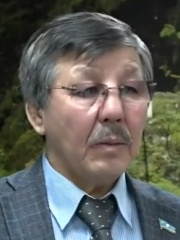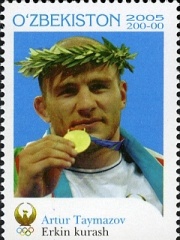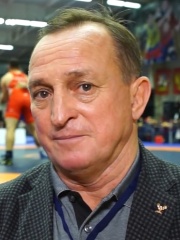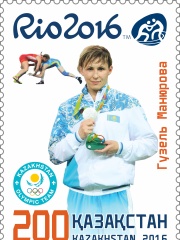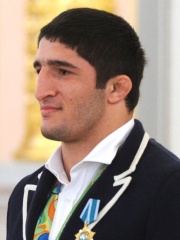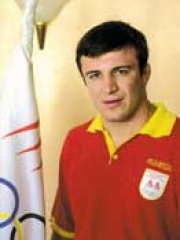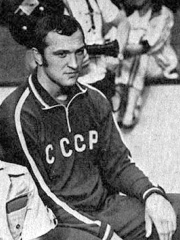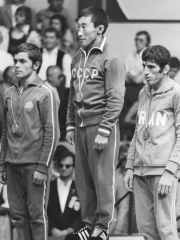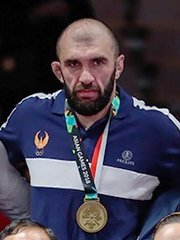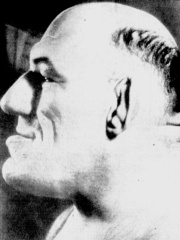
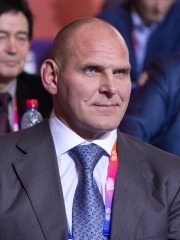
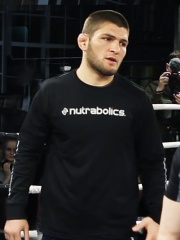
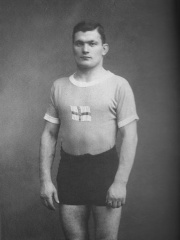
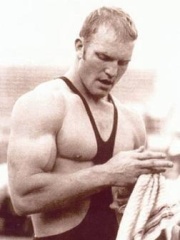
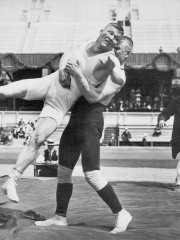
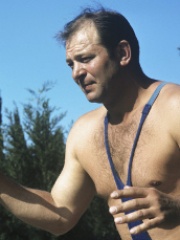

The Most Famous
WRESTLERS from Russia
This page contains a list of the greatest Russian Wrestlers. The pantheon dataset contains 1,027 Wrestlers, 102 of which were born in Russia. This makes Russia the birth place of the 3rd most number of Wrestlers behind United States, and Japan.
Top 10
The following people are considered by Pantheon to be the top 10 most legendary Russian Wrestlers of all time. This list of famous Russian Wrestlers is sorted by HPI (Historical Popularity Index), a metric that aggregates information on a biography's online popularity. Visit the rankings page to view the entire list of Russian Wrestlers.

1. The French Angel (1903 - 1954)
With an HPI of 70.40, The French Angel is the most famous Russian Wrestler. His biography has been translated into 22 different languages on wikipedia.
Maurice Tillet (French: [mɔʁis tije]; Russian: Мори́с Тийе́; 23 October 1903 – 4 September 1954) was a Russian-French professional wrestler, better known by his ring name, The French Angel/The Angel. Tillet was a leading box office draw in the early 1940s and was twice World Heavyweight Champion in the American Wrestling Association run by Paul Bowser in Boston.

2. Aleksandr Karelin (b. 1967)
With an HPI of 67.21, Aleksandr Karelin is the 2nd most famous Russian Wrestler. His biography has been translated into 54 different languages.
Aleksandr Aleksandrovich Karelin (Russian: Александр Александрович Карелин, IPA: [ɐlʲɪkˈsandr ɐlʲɪkˈsandrəvʲɪtɕ kɐˈrʲelʲɪn]; born 19 September 1967) is a Russian politician and retired athlete. Karelin competed in Greco-Roman wrestling, representing the Soviet Union and Russia between 1986 and 2000. Nicknamed the "Russian Bear", "Russian King Kong", "Alexander the Great", "The Experiment", and "The Crane from Novosibirsk", he is widely considered to be the greatest and most dominant Greco-Roman wrestler of all time. Karelin won gold medals at the 1988, 1992, and 1996 Olympic Games under a different flag each time (Soviet Union, Unified Team, and Russia respectively), and a silver medal at the 2000 Olympic Games. His wrestling record at the senior level was 887 wins and two losses, both considered controversial and both by a single point. Prior to his defeat to American Rulon Gardner at the 2000 Olympics finals, a point had not been scored against him in competition the previous six years. He went undefeated in the World Championships, having never lost a match, winning nine gold medals. He was the national flag bearer at three consecutive Olympics: in 1988 for the Soviet Union, in 1992 for the Unified Team, and in 1996 for Russia. In addition to his success in wrestling, he was a sambo champion during his service in the Internal Troops, and participated in a strongman contest. Due to his dominance and accomplishments, he was named the greatest Greco-Roman wrestler of the 20th century by the International Federation of Associated Wrestling Styles (FILA), and is part of the class of ten inaugural inductees into the FILA International Wrestling Hall of Fame in 2003. In 2007, Karelin, alongside Buvaisar Saitiev, were voted the best wrestlers in the history of the sport by FILA. Four times he was awarded the "Golden Belt" as the best wrestler of the planet by FILA – in 1989, 1990, 1992, and 1994. Karelin was named a Hero of the Russian Federation in 1996. Karelin entered politics in 1999, being elected a deputy of the State Duma that year. He sat in the Duma through various convocations until 2020, when he entered the Federation Council as a senator.

3. Khabib Nurmagomedov (b. 1988)
With an HPI of 63.23, Khabib Nurmagomedov is the 3rd most famous Russian Wrestler. His biography has been translated into 64 different languages.
Khabib Abdulmanapovich Nurmagomedov (born 20 September 1988) is a Russian former professional mixed martial artist who competed in the Lightweight division of the Ultimate Fighting Championship (UFC). He was the longest-reigning UFC Lightweight Champion ever, having held the title from April 2018 to March 2021. With 29 wins and no losses, he retired with an undefeated record. Nurmagomedov is widely considered to be among the greatest mixed martial artists of all time, and was inducted into the UFC Hall of Fame on June 30, 2022. A two-time world champion in combat sambo, Nurmagomedov has a background in wrestling, judo, and sambo. Nurmagomedov was ranked #1 in the UFC men's pound-for-pound rankings at the time of his retirement, until being removed following his title vacation in March 2021. Fight Matrix ranks him as the #1 lightweight of all time. In 2019, Forbes ranked Nurmagomedov as the No. 1 most successful Russian athlete; Nurmagomedov also topped the list of the 40 most successful Russian show business and sports personalities under 40. Nurmagomedov is also a mixed martial arts trainer and promoter, known for founding Eagles MMA and promoting the Eagle Fighting Championship (EFC). After retirement, he transitioned to being a full-time coach and cornerman before retiring from the sport completely in January 2023. Throughout his career, Nurmagomedov has become the subject of many controversies, including a longstanding affiliation with Chechnya's leader, Ramzan Kadyrov, questionable affiliations with oligarchs, advocacy for increased cultural censorship and misogynism.

4. Oskari Friman (1893 - 1933)
With an HPI of 61.14, Oskari Friman is the 4th most famous Russian Wrestler. His biography has been translated into 20 different languages.
Oskar David "Oskari" Friman (27 January 1893 – 19 October 1933) was a Greco-Roman wrestler from Finland. He won gold medals in lightweight categories at the 1920 and 1924 Olympics and 1921 World Championships. Nationally he collected eleven Finnish titles, in 1915–1924 and 1928. Friman took up wrestling in 1908, and by 1915 became one of the best Finnish lightweight wrestlers, together with his clubmate Emil Väre. Because of World War I, he started competing internationally only at the 1920 Olympics, where he dropped to featherweight to avoid meeting Väre. Väre retired soon after that, and Friman returned to lightweight. During those years he worked as a butcher and tinsmith, but later, when he became famous and retired from competitions, he was hired as head coach of the Finnish and Swedish national wrestling teams.
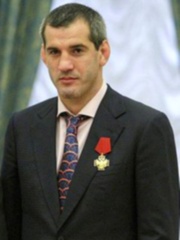
5. Buvaisar Saitiev (1975 - 2025)
With an HPI of 60.70, Buvaisar Saitiev is the 5th most famous Russian Wrestler. His biography has been translated into 38 different languages.
Buvaisar Hamidovich Saitiev (Russian: Бувайсар Хамидович Сайтиев, Chechen: Сайт КIант Бувайса; 11 March 1975 – 2 March 2025) was a Russian wrestler and politician. His total of nine world-level gold medals (three Olympics, six World Championships) in freestyle wrestling is second highest, behind Aleksandr Medved's 10. Saitiev is widely considered to be the greatest freestyle wrestler of all time; in 2007, he and Greco-Roman practitioner Aleksandr Karelin were voted the best wrestlers in the history of the sport by FILA. After his retirement from competition, Saitiev served as an acting deputy from Dagestan in the 7th State Duma from 2016 until he stepped down in 2021. In 2015, he became the President of the Chechen Wrestling Federation, a position he held until his death in 2025.

6. Ivan Yarygin (1948 - 1997)
With an HPI of 56.90, Ivan Yarygin is the 6th most famous Russian Wrestler. His biography has been translated into 20 different languages.
Ivan Sergeyevich Yarygin (Russian: Иван Сергеевич Ярыгин, IPA: [ɪˈvan sʲɪrˈɡʲe(j)ɪvʲɪtɕ jɪˈrɨɡʲɪn]; 7 November 1948 – 11 October 1997) was a Soviet and Russian heavyweight freestyle wrestler. Between 1970 and 1980 he won all his major international competitions, except for the 1970 and 1974 European championships where he placed second. Yarygin was an Olympic champion in 1972 and 1976, being the first wrestler to go through an Olympic competition with straight pin victories and no foul points, a world champion in 1973, a World Cup winner five times, has never lost a single match in World Cup competition, and a European champion in 1972 and 1975–76, and won a world cup in 1973, 1976–77 and 1979–80. He also set a record for the fastest pin victory in the World Cup history at 27 seconds. After retiring in 1980, he headed the Soviet freestyle wrestling team from 1982 to 1992 and the Russian Wrestling Federation from 1993 until his untimely death in a car crash in 1997. An exceptional upper-body wrestler, Yarygin was widely regarded for his tremendous physique and high-strength aggressive style, always aiming to pin down his opponents, with most of his stoppage wins came by way of fall achieved through rapid fireman's lift and slamming the opponent to the mat. One of the most prestigious tournaments in the World was put together in his honor - The Golden Grand Prix Ivan Yarygin Tournament is held annually in Krasnoyarsk, Russia, and has the reputation of being one of the hardest tournaments in the World. The Yarygin Memorial annually sees the world's best wrestlers come to Siberia, with the added element that Russia's autonomous oblasts and republics such as Dagestan and Chechnya field independent teams alongside an All-Russia selection.

7. Alfred Asikainen (1888 - 1942)
With an HPI of 56.40, Alfred Asikainen is the 7th most famous Russian Wrestler. His biography has been translated into 16 different languages.
Alfred Johan "Alpo" Asikainen (2 November 1888 – 7 January 1942) was a Finnish wrestler who competed in the 1912 Summer Olympics, winning the bronze medal.

8. Anatoly Roshchin (1932 - 2016)
With an HPI of 54.13, Anatoly Roshchin is the 8th most famous Russian Wrestler. His biography has been translated into 17 different languages.
Anatoly Aleksandrovich Roshchin (Russian: Анатолий Александрович Рощин, 10 March 1932 – 5 January 2016) was a heavyweight Greco-Roman wrestler from Russia. Between 1962 and 1972 he won nine medals at the Summer Olympics and world championships, including four gold medals. Roshchin lost his father during World War II and had to start working as a shepherd aged 10. In 1950, seeking a better job, he moved from his village to Moscow. At the time he trained in weightlifting and basketball and changed to wrestling only in 1954, while serving in the Soviet Navy. His career was interrupted in 1957, when he was diagnosed with a thyroid disorder that required a complex surgery. He recovered by 1960, and in 1961 placed second at the Soviet championships. He also placed second at the 1962 World Championships and 1964 and 1968 Olympics, losing to István Kozma on all occasions, but won the world and Olympic titles in 1963, 1969, 1970 and 1972. Roshchin needed to wind himself up 10–15 minutes before a bout, and for this purpose would often start a friendly verbal brawl with teammates. By 1972, when he was 40 years old, he was already working as a coach and looking into retirement. He was convinced to compete at the Munich Olympics by the Soviet Sports minister Sergei Pavlov, and won the gold medal. In the last bout he won by default against Wilfried Dietrich, who had a spectacular victory earlier in the tournament and did not want to spoil it by a potential loss. Roshchin retired after the Olympics and later worked as a sports instructor and an international wrestling referee.

9. Sergei Beloglazov (b. 1956)
With an HPI of 53.34, Sergei Beloglazov is the 9th most famous Russian Wrestler. His biography has been translated into 18 different languages.
Sergei Alekseyevich Beloglazov (Russian: Серге́й Алексеевич Белоглазов, born 16 September 1956 in Kaliningrad) is a Soviet and Russian former Olympic wrestler and World Champion. He trained at the Armed Forces sports society in Kaliningrad in 1976–77 and at Dynamo in Kiev since 1979. He was a two-time Olympic Champion in 1980 and 1988, a six-time World Champion and a World Silver medalist. He has a twin brother Anatoly Beloglazov, who was an Olympic Champion in 1980 and a three-time World Champion. He wrestled for coach Granit Taropin for the former Soviet Union. He is regarded by many to be one of the greatest freestyle wrestlers of all time. His son, Sergei S. Beloglazov, died in a car accident at the age of 26 in Sonoma, CA. As of April 2009, Sergei is the National Head Coach of the Wrestling Federation of Singapore. On August 31, 2018, Beloglazov was named the Cliff Keen Wrestling Club head coach in Ann Arbor, Michigan.[3]
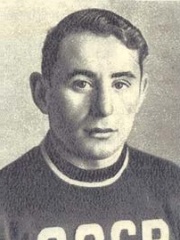
10. Boris Gurevich (1931 - 1995)
With an HPI of 52.31, Boris Gurevich is the 10th most famous Russian Wrestler. His biography has been translated into 15 different languages.
Boris Maksimovich Gurevich (Russian: Борис Максимович Гуревич; 23 March 1931 – 10 January 1995) was a flyweight Greco-Roman wrestler from the Soviet Union. He won gold medals at the 1952 Olympics, the 1953 world championships, and the 1958 world championships. Gurevich first trained in gymnastics and later took up wrestling in 1948. He won the Soviet wrestling titles in 1950 and 1955, placed second in 1952, 1959, and 1960, and placed third in 1963. After retiring from competitions he coached wrestlers in Moscow, where an annual international wrestling tournament has been held in his honor since 1996.
People
Pantheon has 102 people classified as Russian wrestlers born between 1888 and 2003. Of these 102, 93 (91.18%) of them are still alive today. The most famous living Russian wrestlers include Aleksandr Karelin, Khabib Nurmagomedov, and Sergei Beloglazov. The most famous deceased Russian wrestlers include The French Angel, Oskari Friman, and Buvaisar Saitiev. As of April 2024, 17 new Russian wrestlers have been added to Pantheon including Sanasar Oganisyan, Aleksandr Pavlov, and Adem Bereket.
Living Russian Wrestlers
Go to all RankingsAleksandr Karelin
1967 - Present
HPI: 67.21
Khabib Nurmagomedov
1988 - Present
HPI: 63.23
Sergei Beloglazov
1956 - Present
HPI: 53.34
Pavel Pinigin
1953 - Present
HPI: 51.65
Adam Saitiev
1977 - Present
HPI: 50.62
Artur Taymazov
1979 - Present
HPI: 50.05
Shamil Khisamutdinov
1950 - Present
HPI: 49.69
Anatoly Beloglazov
1956 - Present
HPI: 48.77
Guzel Manyurova
1978 - Present
HPI: 48.69
Aleksandr Ivanov
1951 - Present
HPI: 47.61
Abdulrashid Sadulaev
1996 - Present
HPI: 47.25
Magomed Ibragimov
1974 - Present
HPI: 47.00
Deceased Russian Wrestlers
Go to all RankingsThe French Angel
1903 - 1954
HPI: 70.40
Oskari Friman
1893 - 1933
HPI: 61.14
Buvaisar Saitiev
1975 - 2025
HPI: 60.70
Ivan Yarygin
1948 - 1997
HPI: 56.90
Alfred Asikainen
1888 - 1942
HPI: 56.40
Anatoly Roshchin
1932 - 2016
HPI: 54.13
Boris Gurevich
1931 - 1995
HPI: 52.31
Soslan Andiyev
1952 - 2018
HPI: 51.67
Roman Dmitriyev
1949 - 2010
HPI: 51.46
Newly Added Russian Wrestlers (2025)
Go to all RankingsSanasar Oganisyan
1960 - Present
HPI: 46.21
Aleksandr Pavlov
1973 - Present
HPI: 43.09
Adem Bereket
1973 - Present
HPI: 43.06
Yelena Petrova
1966 - Present
HPI: 42.63
Magomed Ramazanov
1993 - Present
HPI: 41.88
Dauren Kurugliev
1992 - Present
HPI: 41.70
Magomed Ibragimov
1985 - Present
HPI: 40.62
Aleksandr Tretyakov
1972 - Present
HPI: 40.26
Razambek Zhamalov
1998 - Present
HPI: 39.68
Chermen Valiev
1998 - Present
HPI: 39.36
Amiran Kardanov
1976 - Present
HPI: 38.69
Marid Mutalimov
1980 - Present
HPI: 37.88
Overlapping Lives
Which Wrestlers were alive at the same time? This visualization shows the lifespans of the 8 most globally memorable Wrestlers since 1700.

